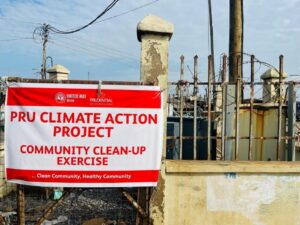Some non-governmental organisations (NGOs), local government officials and residents of Chorkor marked World Environment Day with a community-wide clean-up of choked gutters, flooded streets and neglected public spaces.
The exercise, organised under the Climate and Health Resilience Project, signalled the beginning of a broader initiative combining sanitation, climate education and community participation. The initiative aims to address long-standing environmental and health challenges in Chorkor.
Funded by Prudential Life Insurance Ghana through the Prudent Foundation and implemented by United Way Ghana, the initiative targets Chorkor, a low-lying, densely populated community frequently affected by floods and poor sanitation.
Chorkor’s position along the coast makes it vulnerable to flooding during the rainy season. Combined with poor drainage and open defecation, this has led to repeated outbreaks of diseases such as cholera, malaria and typhoid.
The Communications Coordinator at United Way Ghana, Joseph Matthew, said: “Once the rains set in, stagnant water becomes a breeding ground for mosquitoes and a highway for waterborne diseases. Our goal is to reduce this cycle by building infrastructure, educating the youth and encouraging community-wide behaviour change”.
The project includes the construction of over 100 household bio-digester toilets and a 20-seater toilet facility for the Chumona cluster of schools, targeting the issue of open defecation. Matthew called on the government to introduce incentives for eco-friendly packaging and to tax high-plastic-use companies. He also urged manufacturers to lead in the collection and recycling of plastic waste. “Corporate responsibility must go beyond charity,” he said. “It should drive systems change.”
The Head of Sustainability at Prudential Life Insurance Ghana, Gifty Owusu, said the effort focuses not just on infrastructure but also on awareness. “You can’t ask people to stop defecating in the open without giving them alternatives,” she said, adding: “We’re combining the construction of toilets with education, workshops and environmental clubs in schools”.
These clubs are intended to help instil values of hygiene, recycling and environmental responsibility among young people. The project is being implemented with active community involvement. Local leaders, teachers, health workers and youth groups like BUZ Stop Boys are engaged in planning and execution. “We’ve made it a priority to get community buy-in from the start,” said Matthew. “Weekly meetings with local committees help us track progress and adjust where needed.”
The Ablekuma South Sub-Metro Director, Nurki Sodjah, led household mobilisation. “We told everyone: ‘don’t open your shops until 11 a.m., come out and help clean’,” she said. “This is your environment.”
She is advocating for more regular clean-ups, better waste disposal infrastructure and wider environmental education. Some community leaders noted the need for better logistics and modest incentives to sustain engagement. The Unit Committee Chair, Alfred Nii Addo Taggoe, said: “We need tools, gloves, boots, shovels, basic logistics to empower people to act. And some small motivation also helps”.
The founder of BUZ Stop Boys, Heneba Kwadwo Safo, called for stronger policies and youth engagement. “Our attitude as a people toward sanitation is worrying. We need to bring back the National Sanitation Day and support young people to lead.” He suggested government support for recycling initiatives to convert plastic waste into useful products such as pavement blocks and school furniture.

Organisers said the Chorkor project could be replicated in other vulnerable communities with the right partnerships and funding. “We hope to take this initiative to other flood-prone parts of the country,” said Gifty. “But we need more donors, government support and community responsibility.”










